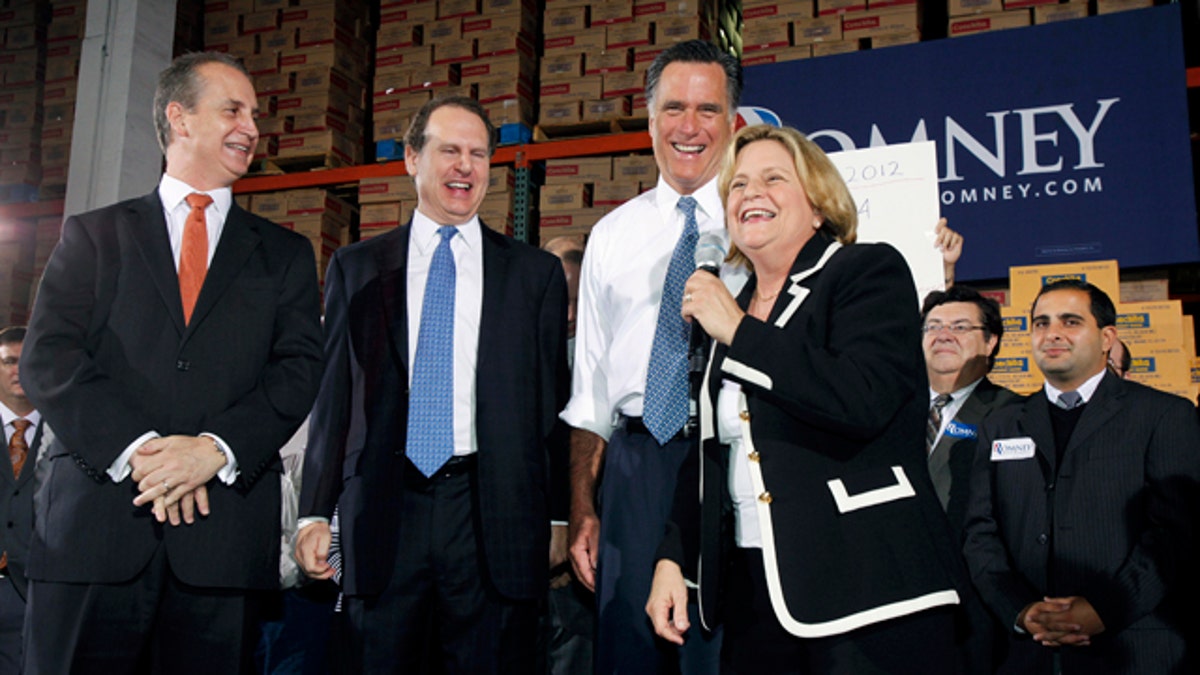
Mitt Romney shares the stage in November with influential Hispanic Republicans in Florida, Rep. Mario Diaz-Balart, former Florida Rep. Lincoln Diaz-Balart and Rep. Ileana Ros-Lehtinen. They helped the Republican presidential candidate secure a Florida victory. (AP)
WASHINGTON – GOP presidential candidate Mitt Romney paid a 14 percent effective income tax rate in 2010 after making $3 million in tax-deductible charitable donations and drawing most of his income from investments, according to a summary of Romney's 2010 tax form provided by his campaign.
Romney reported $21.7 million in income. He paid $3 million in federal taxes, slightly more than the $2.98 million he made in charitable donations. At least $1.5 million of his charitable donations went to the Mormon Church.
Of Romney's 2010 income, he noted a capital gain of $12.6 million, taxable interest of $3.3 million, ordinary dividends of $4.9 million and smaller sums of gains and losses on business income, refunds and other income.
In an estimate of his 2011 taxes, the Romney campaign said Romney would pay $3.23 million in federal tax on $20.9 million in total income. He said he would have itemized deductions of $5.7 million, including $4 million in charitable donations. About $2.6 million of the money that Romney gave to charity in 2011 went to the Mormon Church.
His 2010 return also showed that he had a financial account in Switzerland that was closed in 2010 and that he generated income from overseas investments. He also reported financial accounts in Bermuda and the Cayman Islands.
Democrats and Romney's GOP rivals have long called on the candidate to release his tax forms. During the Republican debate Monday night, after previously resisting, Romney said that he will make public two years of tax releases and no more. He said two years of forms "will satisfy the interest of the American people."
"I pay all the taxes that are legally required, not a dollar more," he said. "I'm proud of the fact that I pay a lot of taxes." His tax bill is significantly higher than the amount paid by most Americans.
The release of the tax information is unlikely to end a problem that has dogged Romney on the campaign trail. Rich Galen, a Republican strategist who used to advise Gingrich, said the Romney release puts him ahead of his rivals' disclosure, "so the number of years isn't the issue; the issue will be the sophisticated use of the existing tax code."
Romney, who would be one of the richest GOP nominees in history, has stumbled at times when he has tried to show sympathy for struggling Americans. He has joked about being unemployed and recently said he feared getting a pink slip early in his career. In his 2008 run for the nomination, the issue didn't register. Today, his rate has become a proxy for a broader debate about how to revamp the U.S. tax code.
Romney received about $500,000 in "author/speaking" fees, according to his tax filing.
The 2010 tax filing lists Romney's occupation as "executive" and his wife, Ann, is listed as a "homemaker." The address listed is in Belmont, Mass.
The former Massachusetts governor told reporters last week he pays a roughly 15 percent tax rate because most of his income results from investments, not a salary. The top rate on income from long-term capital gains and dividends is typically is 15 percent, considerably less than the top rate of 35 percent levied on regular salary income.
That preferential rate for investment income, which was instituted as part of the Bush tax cuts to spur investment, is the basic reason why Romney and his wife have an effective rate of around 15 percent.
On the stump, Romney talks frequently about providing certainty to middle-class families. He wants to eliminate taxes on dividends and capital gains for households that earn less than $200,000 a year.
The Romneys filed five forms in 2010 disclosing transactions relating to investment funds that could raise red flags with the IRS. The government requires taxpayers to report some transactions that have characteristics that might suggest the use of tax shelters, such as generation of a large loss.
A Romney spokesman said to his knowledge none of the transactions could "remotely be considered" tax shelters. The transactions were performed by third parties, not
Romney is worth between $84.8 million and $264.7 million, according to a financial disclosure form released by the Romney campaign last year when he entered the presidential campaign. Campaign aides have said the actual figure is near the higher end, between $190 million and $250 million.
Click here to read more on this story from The Wall Street Journal.




